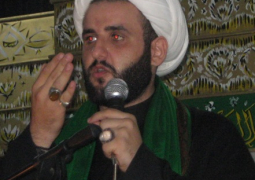
It appears that one of the reasons for the variation in miracle is that in the times of earlier Prophets, people were inclined to believe only on the basis of material observations of visible objects that lacked any spiritual content. The fetters imposed on human thought by the seers and sages of those times caused people’s attention to be limited to a particular realm, which in turn, was the most significant factor in separating them from God and causing their minds to stagnate. The destruction of such a limited mode of thought was therefore of necessity a principal aim of the Prophets. The Prophets were entrusted by God with the duty of attacking this source of error by confronting the seers and soothsayers with deeds of a type similar to that which they performed, but enjoying a special advantage that placed them beyond the reach of all competition. By the power of the miracle they negated and destroyed that particular cause of the human beings’ separation from God- the concentration of their attention on the dazzling acts performed by the soothsayers of the age which enslaved their spirits. By demonstrating their own miracle and setting forth the realistic principles of Divine religion, they opened the doors of guidance, growth and development toward perfection, and linked all dimensions of human life and activity to God. All of this survives from the real nature of the miracle.
The Prophet of Islam began conveying his heavenly message in the midst of a society where people’s mind revolved exclusively around eloquent speech and the composition of beautiful and attractive poetry and literary excellence. Precisely this concentration on a field of activity that cannot be counted among the basic and vital concerns of the human being was an important factor in prolonging the stagnation of thought and lack of attention to the source of all existence. Under these conditions, God equipped His Prophet with a weapon, the Quran, that apparently belonged to the same category as the literary works of the age but possessed unique and astonishing characteristics that were beyond the capacity of the human being to reproduce. The Quran’s sweetness of speech, the attraction exerted by the verses of God’s book, filled the hearts of the Arabs with new feeling and perception. Their deep attention was drawn to this Divine trust that had come to them, this inimitable work. Fully versed as they were in the arts and subtleties of rhetoric, they realized that the extraordinary eloquence of the Quran was beyond the power of man to produce. It was impossible for someone to hear the Quran and understand its meaning without being profoundly affected by its power to attract. From the beginning of revelation, the Quran was then the most important factor in bringing the human being to God’s religion.
Moreover, if the Prophet of Islam had performed some miracle other than the Quran, it would have had no meaning for that people, given their mental structure. The path would have been open for all kinds of doubt and hesitation. But the Arabs of that age who were addressed by the Quran could never have any doubts about its extraordinary eloquence, for they were well aware of all the mysteries of rhetoric and had living among them masters of language and literary composition. At the same time, since the Quran is intended to be an eternal miracle, revealed to make science and learning blossom among human beings, it is also a scientific miracle. It has expounded, in the most eloquent fashion, truth of a metaphysical nature together with everything that touches, however slightly, on the happiness of wretchedness of the human being. Although those who are not acquainted with the Arabic language cannot fully appreciate its miraculousness, they can perceive the miraculous nature of the meanings and truths it contains. The limitation in time of the miracles performed by the earlier Prophets was an indication of the impermanence of their religions and the laws that they brought. By contrast, the miracle attesting to the prophethood for the Prophet of Islam cannot be temporally limited, because his message is universal and represents the culmination of all preceding religions; his prophethood requires an eternal miracle, a brilliant and eloquent proof of its immortality.
A permanent message must display to mankind a permanent and everlasting miracle, one which advances with time, so that just as it offered convincing proofto people of the past, it may do the same to people of the future. A short-lived miracle that is imperceptible to later generations cannot be a source of reference or judgment for the future. For this reason, the Quran is presented as a permanent and everlasting miracle, the final manifestation of God’s revelation. The Quran itself says: “The true and well-formulated message of your Lord has now been completed, and none is able to change it.” (6:115). From the very first day when he presented his religion as a universal school of thought, the influence of which was not to be contained by geographical or ethnic boundaries, the Prophet of Islam displayed this proof of his messengerhood to the whole of mankind, as a living proof that his mission and the revolutionary movement he inaugurated represented the final chapter in the history of prophetic missions and movements. The Quran does not represent an ideological weapon for temporary use in moving from an inferior social system to a superior one at a given stage in history; it represents the permanent ideology of the human being living in the social and intellectual order of Islam.
The miracle accompanying the mission of the beloved Prophet of Islam brings to an end all the previous messages, limited as they were to certain time. In its unique style, the Quran provides the human being with all necessary guidance by means of either recalling the circumstances leading to the revelation of various verses or of recounting of historical narratives or of describing the events that took place during the life of the Prophet, or by means of various similes and comparisons that touch on the different concerns of human life and guide the human being in the direction of higher degrees. By analyzing the stories and events contained in the Quran, which include also a distinctively Quranic mode of judgment, it is possible to deduce certain general principle. Although the gradual and orderly descent of the Quranic revelation was regarded as a defeat by superficial and ignorant people, it should in fact, be recognized as a principal factor in the triumph of the Prophet’s message, given the conditions of the age and the events with which he was confronted
To be continued



